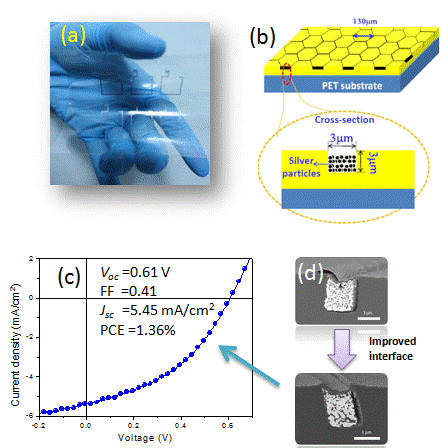In recent years, considerable efforts have been directed toward the development of organic photovoltaic cell (OPV). A critical step towards the commercialization of OPV is to develop low cost, large area and flexible device fabrication technologies. High-throughput roll-to-roll printing and coating techniques have been demonstrated, although the device flexibility and performance have been limited by the use of indium tin oxide (ITO). One challenge of conventional ITO electrodes is that indium is a relatively scarce element and the brittleness of ITO renders. Another challenge is that plastic substrates, such as polyethylene terephthalate (PET), generally have low glass transition temperature (Tg), which can not bear annealing process of active layer like blend film of P3HT:PCBM. It is thus the aim of this work to fabricate OPV devices with ITO-free electrodes and annealing-free solution processes on flexible PET substrates.
Recently, CHEN Liwei’s research group at Suzhou Institute of Nano-Tech & Nano-Bionics, Chinese Academy of Sciences (SINANO) developed ITO-free flexible OPV based on the transparent conductive films developed at Suzhou NanoGrid Technology Ltd. The films consist of high-resolution hexagonal silver grid patterns (Ag-grid) embedded in PET substrates using a proprietary printing technology. Unlike other metal grids published in literature, the high-resolution Ag-grid pattern is invisible to naked eyes because the Ag-grid lines are less than 3 micron wide. The film displays ~ 0.5 ?/□ sheet resistance while maintaining over 85% light transmittance, which make it promising for applications in large area flexible OPV without using ITO coated substrates.
Researchers have demonstrated that embedded silver grid with PH1000 coating can be good electrodes for large area flexible OPV. High-resolution silver grid on flexible PET substrate shows high optical transparency and good electrical conductivity. Comparison of flexible OPVs with different electrodes revealed that the Ag-grid facilitates charge transport and collection from the PH1000 electrode layer, which leads to increases in FF, Jsc, and PCE. The morphology of the PET/Ag-grid/PH1000 hybrid electrode based device has a significant effect on its photovoltaic performance. The modified PET/Ag-grid:PH1000/PH1000 hybrid electrode,shows improved surface flatness and device morphology. The PCE of this hybrid electrode based device reaches 1.36% on a large device area (1.21 cm2).
This work was published in Solar Energy Materials and Solar Cells (2013, 113, 85).

Figure (a) Photograph of Ag-grid on PET substrate; (b) high-resolution Ag-grid embedded in PET based substrate. Black line represent Ag-grid, yellow areas are pastern, blue areas are PET substrate; (c) J-V curve of PET/Ag-grid:PH1000/PH1000 hybrid electrode; (d) cross-sectional SEM images of device before and after mixing PH1000.
This work was supported by National Natural Science Foundation of China, Knowledge Innovation Program of the Chinese Academy of Sciences, National Basic Research Program of China, Chinese Academy of Science “Hundred Talents” program.
downloadFile
